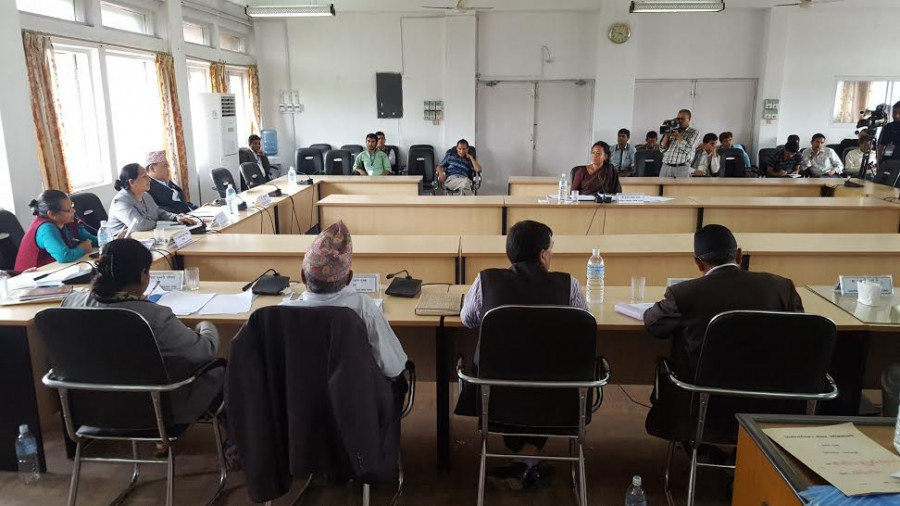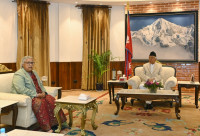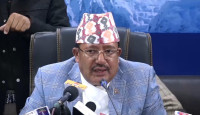National
Parliamentary hearing no more than ritual, experts say
Former bureaucrats, committee members say panel is obliged to toe the party line.
Binod Ghimire
The Parliamentary Hearing Committee on Tuesday called on the members of the general public to file complaints against two justices nominated to the Supreme Court by the Judicial Council on March 12.
The council, led by Chief Justice Cholendra Shumsher Rana had nominated Nahakul Subedi and Kumar Chudal—both high court chief judges—to the Supreme Court and 13 others to the lower court. The committee has given 10 days to the public to file complaints with arguments against the nomination of Subedi and Chudal.
Article 292 of the Constitution of Nepal makes it mandatory for the chief justice, justices, and those nominated to constitutional commissions and ambassadorial positions to face a parliamentary hearing before they are appointed to the positions they are nominated to.
The fifteen-member committee is authorised to reject nominations made by the constitutional council, judicial council, and by the Cabinet. However, except in the case of Deepak Raj Joshi, who was recommended for the chief justice in June 2018, the panel hasn’t rejected any recommendations ever since the hearing process started in 2007 with the promulgation of the Interim Constitution of Nepal.
Article 155 of the interim constitution, for the first time, included a provision for a parliamentary hearing to ensure that the committee comprising people’s representatives rectify decisions made by the government and constitutional and judicial councils. Despite complaints filed against nominees, the hearing committee hasn’t done anything, except quiz them.
For instance, despite several complaints related to their birth certificates and academic credentials, the hearing committee in 2014, Gopal Parajuli, and Joshi were appointed to the Supreme Court. The committee in July 2017 endorsed Parajuli’s nomination as chief justice even though his different verdicts had landed into controversies while the issue of dubious academic credentials and birth certificates remained unsettled.
Similarly, Samim Miya Ansari’s nomination as chairperson of the Muslim Commission was endorsed in February 2020 though his citizenship and academic certificates were allegedly dubious.
Constitutional law experts say the hearing process has become ritualistic as lawmakers on the committee have failed to perform as per the spirit of the constitution. “The provision of parliamentary hearing makes no sense if it doesn’t stop appointments of people who have a controversial history,” Raju Prasad Chapagain, chairperson of the Constitutional Lawyers’ Forum, told the Post. “The provision was introduced with a good intention, however, the committee has failed to perform its constitutional duties.”
The nomination of Subedi and Chudal have already landed in controversy and the committee will likely receive complaints against them. As per Article 129 (5) of the constitution, a candidate for the post of justice at the Supreme Court needs to have either 12 years of experience as a first-class officer (joint secretary level) or five years of experience as a judge or chief judge of the High Court. However, it’s been hardly three years since Subedi was appointed judge on January 4, 2018.
Similarly, Subedi was appointed joint-secretary in August 2007 and was appointed chief judge after spending a little over 10 years in that position. Chudal’s verdicts, especially over issues related to taxation, have been flagged by experts as “controversial”.
Som Bahadur Thapa, former secretary at the parliament secretariat, said he doesn’t see any possibility of the hearing committee rejecting the nominations, no matter how controversial the nominees are. “The hearing committee is a shadow of the parties and it is just a rubber stamp,” he told the Post. “Its job is to vet the recommendations, but it has completely failed on that front.”
He said the lawmakers in the committee neither dare to air their independent views while conducting the hearing nor go against party interests during the voting process.
Party leaders who have been on the hearing committee partially agree with Thapa. Chin Kaji Shrestha, former member of the committee and former chief whip of the Nepali Congress, said committee members are obliged to work as per the interests of the party. “It’s not that we don’t have an independent view. On different occasions we have raised questions over the recommendation,” he told the Post. “However, we don’t go against the party line.”
Shrestha said in 2014 when the Constitutional Council recommended five office bearers, including former Chief Justice Anup Raj Sharma, to the National Human Rights Commission, the committee had opposed it saying it was not inclusive. Among the five, four were male Brahmins while Mohna Ansari was the only woman.
He said the committee, however, endorsed the recommendations as per requests from then Prime Minister Sushil Koirala, who chaired the Constitutional Council. “We could draw the attention of the government, but not reject a nomination,” he said.




 10.95°C Kathmandu
10.95°C Kathmandu















